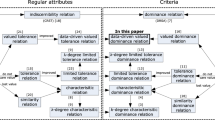Abstract
Through analyzing limitations of four existing dominance relations in disjunctive set-valued information systems, a variable precision dominance relation is proposed, and an extended rough set model based on the variable precision dominance relation is defined. In order to derive much simpler attribute representation, a discernibility matrix is defined, and an attribute reduction method based on the discernibility matrix is developed.
Access this chapter
Tax calculation will be finalised at checkout
Purchases are for personal use only
Preview
Unable to display preview. Download preview PDF.
Similar content being viewed by others
References
Greco, S., Matarazzo, B., Slowinski, R.: Rough Approximation of A Preference Relation by Dominance Relations. European Journal of Operational Research. 117(1), 63–83 (1999)
Greco, S., Matarazzo, B., Slowinski, R.: Rough Approximation by Dominance Relation. International Journal of Intelligent Systems 17(2), 153–171 (2002)
Inuiguchi, M., Yoshioka, Y., Kusunoki, Y.: Variable-precision Dominance-based Rough Set Approach and Attribute Reduction. International Journal of Approximate Reasoning 50(8), 1199–1214 (2009)
Qian, Y.H., Liang, J.Y., Song, P., Dang, C.Y.: On Dominance Relations in Disjunctive Set-valued Ordered Information Systems. International Journal of Information Technology & Decision Making 9(1), 9–33 (2010)
Skowron, A., Rauszer, C.: The Discernibility Matrices and Functions in Information Systems. In: Sowiski, R. (ed.) Intelligent Decision Support. Handbook of Applications and Advances of the Rough Sets Theory, pp. 331–362. Kluwer, Dordrecht (1992)
Zhang, W.X., Wu, W.Z., Liang, J.Y., Li, D.Y.: Theory and Method of Rough Sets. Science Press, Beijing (2001) (in Chinese)
Author information
Authors and Affiliations
Editor information
Editors and Affiliations
Rights and permissions
Copyright information
© 2011 Springer-Verlag Berlin Heidelberg
About this paper
Cite this paper
Wang, G., Yang, Q., Zhang, Q. (2011). Disjunctive Set-Valued Ordered Information Systems Based on Variable Precision Dominance Relation. In: Kuznetsov, S.O., Ślęzak, D., Hepting, D.H., Mirkin, B.G. (eds) Rough Sets, Fuzzy Sets, Data Mining and Granular Computing. RSFDGrC 2011. Lecture Notes in Computer Science(), vol 6743. Springer, Berlin, Heidelberg. https://doi.org/10.1007/978-3-642-21881-1_33
Download citation
DOI: https://doi.org/10.1007/978-3-642-21881-1_33
Publisher Name: Springer, Berlin, Heidelberg
Print ISBN: 978-3-642-21880-4
Online ISBN: 978-3-642-21881-1
eBook Packages: Computer ScienceComputer Science (R0)

